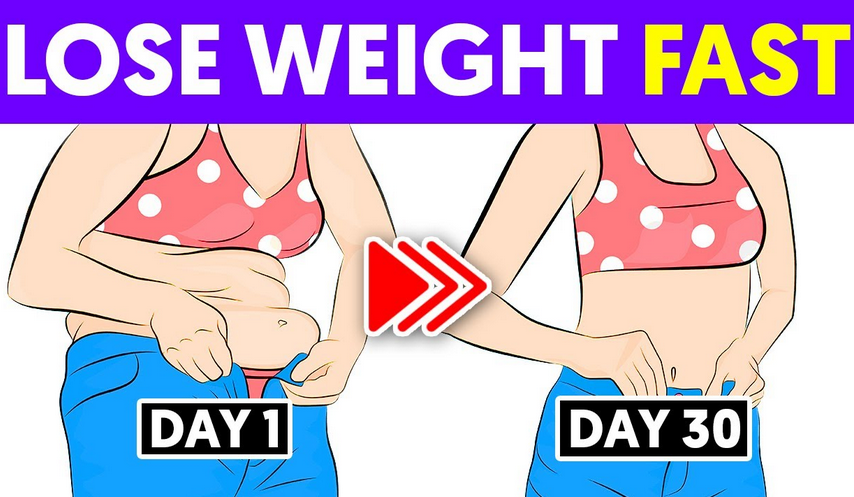1. The Scientific Approach to Weight Loss a. Calories In vs. Calories Out
- The value of metabolism and why it matters
- Implications of Physical Activity
2. Simple weight loss strategies
- Take in plenty of fluids.
- Consume protein- and fiber-rich foods.
- You should avoid eating processed foods and drinking sugary beverages.
- Have a Good Night's Rest
- Skip the lift and use the stairwell instead.
- You should eat off of smaller dishes.
- Look for a Workout Pal
- Conscious eating is a skill you can develop.
- Stock up on nutritious munchies.
- Keep a food journal.
- Just try it once in a while if you're interested.
- Strengthen your muscles by working against resistance.
- Avoid becoming drunk.
3. Conclusion
4. FAQs
5. Introduction
It's a struggle for a lot of people to lose weight. Doing so requires restraint, commitment, and strategy. While there is no foolproof method for dropping pounds, there are measures you may take to make the process less trying. Weight loss tips that actually work will be discussed below.
How to lose weight, according to science
Let's briefly discuss the science behind weight reduction before diving into the hacks. If you want to lose weight, it's as easy as subtracting your caloric intake from your total energy expenditure. You need to burn more calories than you consume if you want to reduce your weight. Changing your diet and exercise routine can help you achieve this goal.
The relevance of metabolism
One of the most crucial factors in being able to successfully shed extra pounds is your metabolic rate. Your metabolism is the system by which your body converts the nutrients in the food you eat into energy. The faster your metabolism, the more calories your body burns at rest. Your metabolism can be influenced by a number of factors, including your age, gender, genetics, and level of physical activity.
The Importance of Working Out Why you should work out
One of the most important components of successful weight loss is physical activity. It can boost your metabolism by helping you burn calories and by constructing muscle. Along with reducing the risk of chronic diseases and improving mood, exercise has numerous additional health advantages.
- Simple weight loss strategies
- Now that we have a basic understanding of weight reduction and how it occurs, we can look at some simple strategies.
Have a lot of water available.
Water consumption is associated with a reduction in body mass. In addition to preventing dehydration, drinking water can help you feel full and consume less calories. Aim for eight or more glasses of water every day.
Consume Meals High in Protein and Fiber
Consuming protein- and fiber-rich foods can help you slim down quickly and easily. Consuming protein before a meal can help you feel full and satisfied, while consuming fiber can aid in digestion and prevent you from overeating. Protein and fiber-rich diets include lean meats, legumes, veggies, and whole grains.
Try to stay away from sugary processed foods and beverages.
Processed and sugary beverages also tend to be high in calories but low in nutritional value. Limiting your consumption of these items can help you lose weight and improve your health.
Have a long, restful nap.
Getting enough sleep is crucial for success in losing weight. Lack of sleep can throw off your hormone balance, making you hungrier than usual. You should aim for 7–9 hours of sleep nightly.
Reduce Plate Size
Reduce your portion sizes without feeling deprived by using smaller plates. Using smaller plates has been linked to a reduction in food intake, according to the study's authors.
To save money, you should use the stairwell rather than the elevator.
Instead of taking the elevator, go up the stairs for some extra workout. Despite its apparent insignificance, any amount is appreciated.
Get in shape with a friend.
Motivating and holding yourself accountable during weight loss is much easier with an exercise companion. Having a buddy, relative, or coworker to exercise with can make the time go by faster and motivate you to achieve greater results.
It's more probable that you'll stick to your exercise routine and get results when you have a training partner. You're more likely to branch out and attempt something new after exercising. Having a workout partner might also help the time go by faster.
To begin your search for a workout partner, simply ask around. Get in touch with your loved ones and colleagues to see if anyone is interested in joining you on your fitness journey. You can also find like-minded individuals by enrolling in a fitness class or organization.
Mental concentration when eating is a skill you should cultivate.
Learning to eat mindfully is a skill that can alter your relationship with food and aid in weight loss. Mindful eating is a practice where one eats without distraction or without losing focus on what one is eating.
In order to begin practicing mindful eating, find a quiet place to eat where you won't be interrupted by the TV or your phone. Try taking a few deep breaths to center yourself in the here and now.
Fill up on nutritious munchies
When trying to lose weight, it's important to avoid temptations like fast food and soda by stocking your pantry with nutritious alternatives. If you keep some healthy snacks on hand, you'll be less tempted to reach for the chips or candy in the vending machine.
Some nutritious alternatives are listed below:
- Examples of fresh fruit include apples, bananas, and berries.
- Carrots, celery, and bell peppers are just a few examples of vegetables that taste great when eaten raw.
- One can find nuts and seeds in many different foods, such as almonds, walnuts, and pumpkin seeds.
- The same goes for Greek yogurt or cottage cheese.
- Whole grain crackers or rice cakes with nut or hummus spread.
- Eggs that have been boiled and then hard-cooked.
Snacks should consist of a balance of protein, fiber, and healthy fats to keep you from feeling hungry between meals. It's also essential to keep an eye on your calorie intake and avoid mindless snacking.
Making nutritious snacks in advance can ensure you always have some on hand. Prepare fresh produce for storage by cutting it into bite-sized pieces and placing it in appropriate-sized containers. To kick off the week, prepare a large batch of hard-boiled eggs. In addition, store nuts and seeds in portable containers.
Make a habit of keeping a food diary.
Maintaining a food diary is an effective strategy for slimming down. As a result, you can gain insight into your eating patterns, identify problem areas, and stay committed to your plan.
First, start keeping a food diary by recording everything you consume in a typical day. This includes beverages and food, as well as the amounts consumed. A notebook or smartphone app might help you monitor your dietary intake.
Just try it once in a while if you're interested.
Intermittent fasting has surged in popularity over the past few years as a means of controlling one's weight. The method entails a pattern of fasting followed by periods of eating. Ultimately, you should be able to reduce your calorie intake and hence your body fat percentage.
Intermittent fasting can be done in a variety of ways, but here are two of the most common:
The term “time-restricted feeding” refers to a diet that limits the number of hours in which food can be consumed each day. Some people, for instance, choose to eat all of their food between noon and 8 p.m., skipping meals in between, and then going without eating for the next 16 hours.
Every other day, instead of eating a normal meal, you skip meals altogether.
If you want to reduce weight, intermittent fasting may assist, but only if you do it properly and under the guidance of a medical practitioner. Nevertheless, it's possible that it won't be beneficial for everyone, especially those with a history of eating disorders or other health issues.
Do some form of resistance training regularly.
The addition of resistance training to your workout routine can help you lose weight. Using weights or resistance bands, resistance training helps you gain muscle and strength. This type of exercise not only helps you burn calories when you're doing it, but it also increases your metabolism and keeps your body burning calories even when you're not.
Start with push-ups, squats, and lunges using your own body weight if you're new to resistance training. As you progress in your workout, you can increase the difficulty by using heavier weights or more resistance bands.
Even if your goal isn't weight loss per se, you'll still benefit from doing resistance training. As an illustration, it can increase bone density, decrease injury risk, and generally make you fitter.
Avoid becoming drunk.
For weight loss and general health, reducing alcohol consumption is crucial. While there may be health benefits associated with moderate alcohol consumption, heavy drinking is associated with negative health outcomes such weight gain, insomnia, and impaired cognitive function.
When consumed in large quantities, the calories in alcoholic beverages can soon mount up. There are roughly 150 calories in a 12-ounce beer, 120 calories in a 5-ounce glass of wine, and 100 calories in a 1.5-ounce shot of liquor.
Here are some suggestions for reducing your alcohol consumption:
- Limit yourself: Set a goal for how much alcohol you will consume, and then stick to it. You may, for instance, limit your alcohol intake to once per day or to the weekends only.
- You can reduce your calorie intake by opting for lower-calorie versions of your favorite foods and drinks, such as light beer, wine spritzers, or hard liquor blended with soda water or diet Coke.
Add water in between alcoholic beverages. Drinking water in between alcoholic beverages is a good way to prevent dehydration and maintain a steady pace.
Do not consume alcohol while hungry. If you drink alcohol before eating, you may consume too much of it and make poor choices. If you want to reduce the odds of binge drinking, eat something before you start drinking.
Reduce your calorie intake, enhance your quality of sleep, and aid your health and weight loss efforts by cutting back on alcohol consumption.
Conclusion
Ultimately, there are a variety of approaches to weight loss that can be effective. Choose a method of weight loss that suits you and stick with it. Alternate days without eating, become more conscious of what you put into your body, or simply stock up on nutritious munchies.
Keeping in mind that weight loss isn't always a breeze is crucial. Finding the method of weight loss that works best for your body and lifestyle may require some experimentation. Long-term habits are more likely to provide success than short-term remedies, thus they should be prioritized.
FAQs
What are the potential risks of trying intermittent fasting as a means of weight loss?
Numerous people have found success with intermittent fasting as a means of shedding unwanted pounds in a healthy and safe manner. Those with a history of eating disorders or those with specific medical conditions should exercise with the supervision of a medical practitioner to ensure their safety.
Do I need to exercise in order to lose weight?
Although exercise is crucial for weight reduction and general health, it is still feasible to trim down without making time for workouts. You can lose weight by creating a calorie deficit through adjustments to your food and lifestyle.
If I want to drop some pounds, how many calories should I eat per day?
The number of calories you should aim for in order to lose weight varies according to a number of factors, including your age, gender, height, weight, and activity level. Consult your physician or a certified nutritionist for more specific recommendations.
What if I'm attempting to reduce weight, but I really crave some of my favorite foods?
It's true that you can still enjoy all of your usual fare while on a diet. Moderation and moderation are the keys to healthy eating, and most of the time, nutrient-dense whole foods are the best bet.
Approximately how long does it take for weight loss to become permanent?
The time it takes to see weight loss effects varies from person to person and is determined by factors such as starting weight, calorie intake, and physical activity. A healthy and safe weight loss rate is 1-2 pounds each week.
Introduction
An excellent approach to broaden one's horizons, increase one's knowledge of the world, and create memories to cherish forever is to go on a trip. Yet, maintaining a healthy lifestyle when traveling can be challenging due to factors like jet lag, unfamiliar cuisine, and a shift in routine.
Keeping oneself healthy and fit while on the road requires some forethought and preparation. While traveling, it can be difficult to maintain a healthy routine for both your body and mind. Everything you need to know about maintaining your health and happiness on your next vacation, from how to pack light and eat properly to how to deal with jet lag, we'll cover.



